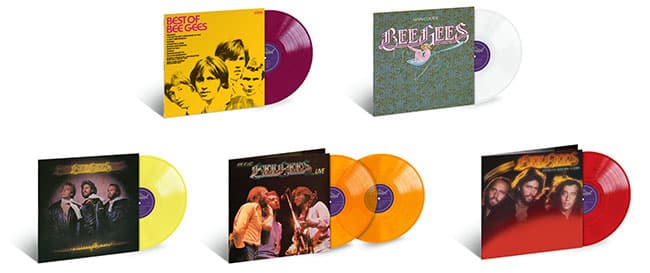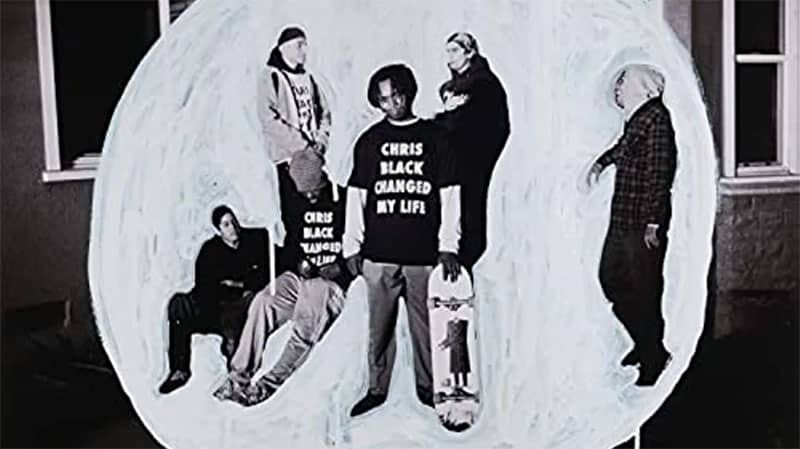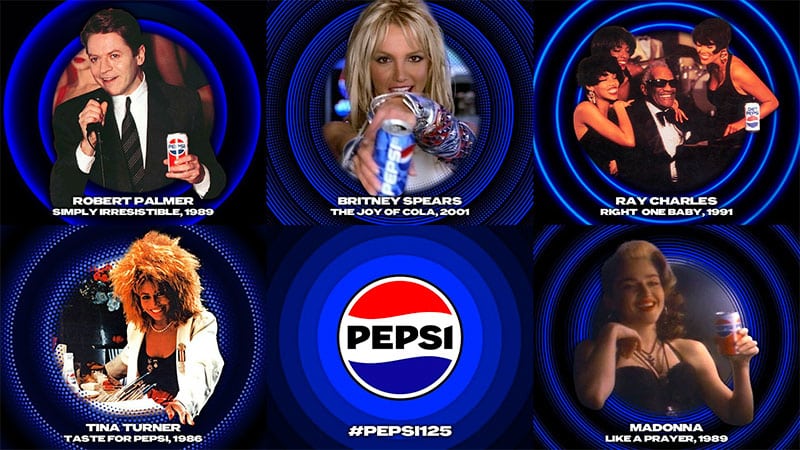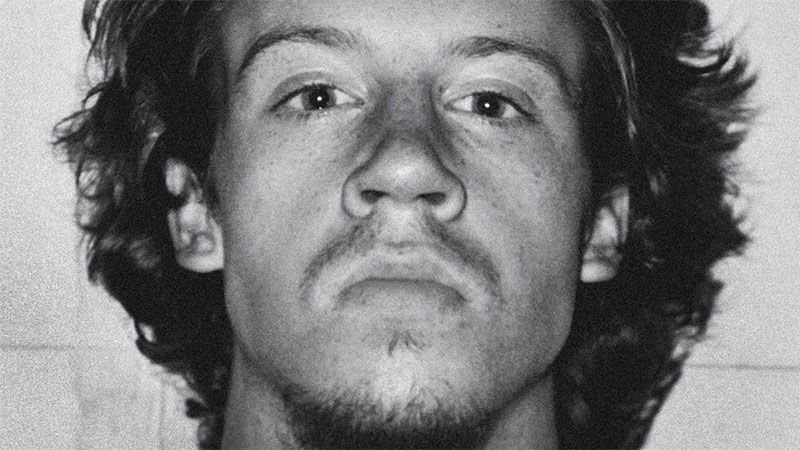Five best-selling albums from legendary group’s catalog celebrated on remastered black and colored LP
On May 8th, Capitol/UMe is set to release five remastered LPs from the storied catalog of the Bee Gees, one of music’s most legendary and acclaimed groups. Each LP has been pressed onto both black vinyl and limited edition colored vinyl. The five LPs are, in chronological order, 1969’s Best Of Bee Gees (on black and berry vinyl), 1975’s Main Course (on black and whitewater vinyl), 1976’s Children Of The World (on black and sunshine yellow vinyl), 1977’s double live album Here At Last…Bee Gees…Live (2 LPs on black and tangerine vinyl), and 1979’s Spirits Having Flown (on black and blood red vinyl). All five albums have been remastered from the original analog LP master tapes at the iconic Capitol Studios by Kevin Bartley and Ian Sefchick.
The Bee Gees’ first greatest hits compilation, Best Of Bee Gees, was released in June 1969, and it features a prime selection of the early hit singles that established the group’s broad musical palette. The twelve gems comprising Best Of are among the most popular songs of the then-burgeoning group’s canon, including the desperately pleading “I Gotta Get A Message To You,” Sir Barry’s classic balladry vocal on “Words,” the harmoniously soulful classic “To Love Somebody,” the pure pop perfection of “Massachusetts,” Robin’s signature vocal on “I Started A Joke,” and the skillful buildup of “Spicks and Specks,” the latter song being the Bee Gees’ first-ever No. 1 record in their homeland of Australia.
June 1975’s Main Course, one of the most significant albums in the Bee Gees catalog, marked a new direction for the group, and in turn created the model for their output throughout the rest of the 1970s by featuring a fresh, R&B-meets-pop sound. Recorded in Miami, Florida, and produced by the legendary Arif Mardin, the album’s infectious No. 1 hit, “Jive Talkin’,” carries a rhythm inspired by the sound the group’s car made on the 163rd Street Causeway Bridge as they drove to and from the recording sessions being held at the fabled Criteria Studios. With Main Course, Mardin and the Gibb brothers continued to explore the use of synthesizers instead of strings in their arrangements. It’s also the first album where Barry Gibb’s hallmark falsetto is most prominent, showcasing the impressive depth of his vocal range. The album’s other hit singles include the dramatic “Nights On Broadway” and the always touching “Fanny (Be Tender With My Love).”
The first single from the Bee Gees’ next album, September 1976’s Children Of The World, “You Should Be Dancing,” went to No. 1 in both the U.S. and Canada, and was also a Top 10 smash in numerous other territories. Children Of The World, which attained certified multi-platinum status in the U.S., was also recorded at Miami’s Criteria Studios, albeit this time produced by the Bee Gees, Karl Richardson, and Albhy Galuten. The album’s other key singles include the uplifting ballad “Love So Right,” the provocatively seductive “Boogie Child,” and the harmony-and-synth-driven title track.
Released in May 1977, Here At Last…Bee Gees…Live, the group’s first live album, was recorded at The Forum in Los Angeles in December 1976. The majority of this palpable 2 LP set was made up of songs that had been big hit singles for the Bee Gees, along with tracks from their aforementioned recent hit albums, Main Course and Children Of The World. Highlighting the group’s magical harmonic vocal blend onstage, Here At Last contains definitive live versions of “You Should Be Dancing,” “Jive Talkin’,” “How Can You Mend A Broken Heart,” “I’ve Gotta Get A Message To You,” “New York Mining Disaster 1941,” “Run To Me,” and many more.
Spirits Having Flown, the 15th Bee Gees album, was released in January 1979, and was the group’s first album following the massive success of 1977’s multi-platinum Saturday Night Fever soundtrack. The first three tracks released from Spirits Having Flown — “Tragedy,” “Too Much Heaven,” and “Love You Inside Out” — all shot to No. 1 in the U.S., giving the Bee Gees an unbroken run of six U.S. chart-toppers in a one-year period. In addition, the Bee Gees donated the copyright of “Too Much Heaven” to Music For UNICEF, a charity they founded along with their longtime Manager Robert Stigwood and Sir David Frost. Spirits was a No. 1 album for the Bee Gees in the U.K. and topped the charts around the world. The album was recorded at the group’s favored Criteria Studios in Miami, where Chicago was simultaneously recording their own hit album, October 1978’s Hot Streets. The two groups wound up collaborating on Chicago’s “Little Miss Loving,” while Chicago’s lauded horn section guested on select Spirits Having Flown tracks.
The Bee Gees — brothers Barry, Robin, and Maurice Gibb, one of the most successful songwriting teams of all time — have long earned their stature as one of the world’s most popular and bestselling groups ever. Having recorded 22 studio albums and for numerous soundtracks, including November 1977’s monumentally successful Saturday Night Fever, the Bee Gees infused popular culture with dozens of worldwide hit singles that featured their singular and highly influential three-part harmonies. They achieved nine No. 1 and 23 Top 10 singles on the Billboard Hot 100 chart, including “How Deep Is Your Love,” “Night Fever,” and “Stayin’ Alive” from Saturday Night Fever, in addition to hitting charts around the world with many other classics, including “How Can You Mend A Broken Heart,” “I Started A Joke,” “Lonely Days,” “Words,” and “You Win Again.”
Among the honors bestowed upon the Bee Gees are eight GRAMMY Awards, including The Recording Academy’s Lifetime Achievement Award and Legend Award; five American Music Awards; a Brit Award for Outstanding Contribution to Music; and a Legend Award from the World Music Awards. The Bee Gees have also been inducted into the Rock and Roll Hall of Fame, the Songwriters Hall of Fame, BMI Icons, the Vocal Group Hall of Fame, and the Dance Music Hall of Fame. All three brothers were honored with a CBE as Commanders of the British Empire in 2002, and Barry was knighted Sir Barry Gibb in 2018.






